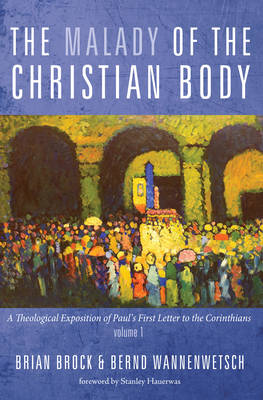
Je cadeautjes zeker op tijd in huis hebben voor de feestdagen? Kom langs in onze winkels en vind het perfecte geschenk!
- Afhalen na 1 uur in een winkel met voorraad
- Gratis thuislevering in België vanaf € 30
- Ruim aanbod met 7 miljoen producten
Je cadeautjes zeker op tijd in huis hebben voor de feestdagen? Kom langs in onze winkels en vind het perfecte geschenk!
- Afhalen na 1 uur in een winkel met voorraad
- Gratis thuislevering in België vanaf € 30
- Ruim aanbod met 7 miljoen producten
Zoeken
€ 37,95
+ 75 punten
Omschrijving
The ailments of the contemporary church are remarkably similar to those suffered by the fractious Corinthian church in the first century. This is the challenge presented in The Malady of the Christian Body, a two-volume commentary by Brian Brock and Bernd Wannenwetsch. The manner in which Paul engages questions of factionalism, sexuality, legal conflict, idolatry, dress codes, and eating habits reveals that neither the malady he diagnoses nor the therapy he offers track the dominant accounts currently on offer of the malaise suffered by today's church. This volume depicts the Apostle as carefully examining the organic whole that is the body of Christ in order to detect obstacles to the healthy flow of powers that sustain its life. The therapy that is then offered comes by way of a redirection of the Corinthian believers' attention to the ways in which they can embrace God's active working among them to heal their broken unity. This book breaks new ground in crossing and reconfiguring the traditional disciplinary boundaries between biblical studies, systematic theology, and theological ethics. ""Thick--that is the word that comes to mind for characterizing this extraordinary commentary. 'Thick' is sometimes associated with 'slow, ' but I am using the term to indicate the richness of the theological readings of Paul offered in this book. I think they touch on every theological issue we confront today. As a result I cannot imagine another resource taking its place for many years."" --Stanley Hauerwas, Gilbert T. Rowe Emeritus Professor of Divinity and Law, Duke University ""While theological readings of Scripture often glide over the text, this one plunges into it. The authors' interpretations are sometimes controversial, often highly original, and always theologically rich and insightful. Most importantly, they invite the reader to participate in their own act and practice of reading 1 Corinthians from and for the church. It is an invitation any theologian or Christian ethicist--indeed, any Christian--would do well to accept."" --Gerald McKenny, Walter Professor of Theology, University of Notre Dame; author of The Analogy of Grace: Karl Barth's Moral Theology ""How are we to learn to hear Paul in such a way that we also may be convicted by his writings to the Corinthians? All too often our hermeneutical preliminaries, historical contextualizations, and efforts to find coherence serve as unconscious stratagems for evading the apostle's message. By helping us to learn to read Paul over against ourselves, Brian Brock and Bernd Wannenwetsch's immensely rewarding and illuminating commentary on 1 Corinthians points us the way to the Christ who is profoundly and truly for us."" --Robert Song, Durham University Brian Brock is Reader in Moral and Practical Theology at the University of Aberdeen. He is the author of Singing the Ethos of God, Christian Ethics in a Technological Age, and most recently, Captive to Christ, Open to the World. Bernd Wannenwetsch was Professor of Systematic Theology and Ethics at the University of Oxford, Chair in Theological Ethics at the University of Aberdeen and the president of the Society for the Study of Christian Ethics. His publications include Political Worship, Guter schneller Tod?, and Verlangen.
Specificaties
Betrokkenen
- Auteur(s):
- Uitgeverij:
Inhoud
- Aantal bladzijden:
- 280
- Taal:
- Engels
Eigenschappen
- Productcode (EAN):
- 9781498234184
- Verschijningsdatum:
- 8/11/2016
- Uitvoering:
- Paperback
- Formaat:
- Trade paperback (VS)
- Afmetingen:
- 152 mm x 226 mm
- Gewicht:
- 385 g

Alleen bij Standaard Boekhandel
+ 75 punten op je klantenkaart van Standaard Boekhandel
Beoordelingen
We publiceren alleen reviews die voldoen aan de voorwaarden voor reviews. Bekijk onze voorwaarden voor reviews.









